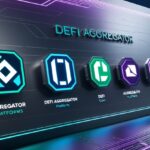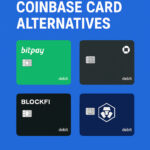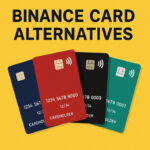In this article, I chose to explain the top cross-chain oracles within the DeFi ecosystem. These cross-chain oracles are essential for the success of DeFi projects
Because they integrate the functioning of the decentralized world with real-life information and enable the use of different chains.
As the world of finance becomes more and more dependent on data, it is important to know which oracles can actually help optimize your DeFi projects.
Key Points & Best Cross-Chain Oracles For DeFi In 2025 List
| Project | Key Points |
|---|---|
| Chainlink | Most widely used oracle; supports multiple blockchains; strong security model. |
| Band Protocol | Fast data delivery; Cosmos-based; lower fees than some competitors. |
| API3 | Focuses on first-party oracles; decentralized APIs (dAPIs); strong data control. |
| Pyth Network | Specializes in high-frequency financial data; strong presence in Solana ecosystem. |
| UMA (Universal Market Access) | Synthetic assets and optimistic oracle for DeFi applications. |
| Tellor | Decentralized, permissionless oracle; uses mining to secure data feeds. |
| DIA (Decentralized Information Asset) | Focus on transparent and customizable data sources for DeFi. |
| Razor Network | Fully decentralized oracle; fast finality and high throughput. |
| DOS Network | Layer-2 oracle network; off-chain computing and real-time data feeds. |
| Avalanche | High-performance blockchain; integrates with multiple oracle services. |
10 Best Cross-Chain Oracles For DeFi In 2025
1.Chainlink
Chainlink is synonymous with the best cross-chain oracles for DeFi, due to its secure and dependable data feeds on various blockchains.
Its decentralized network of node operators guarantees data accuracy and uptime, making it the preferred oracle solution for DeFi platforms.
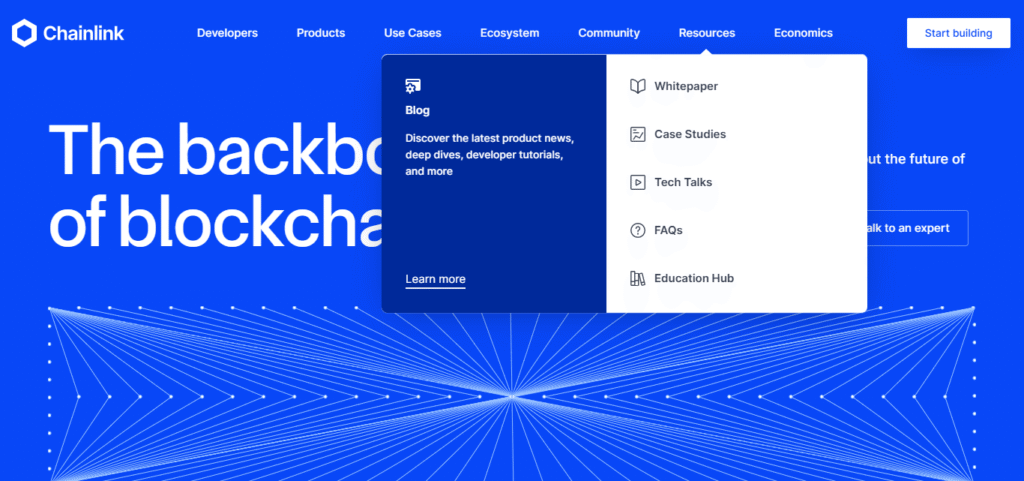
Through its CCIP (Cross-Chain Interoperability Protocol), Chainlink facilitates cross-chain communication between distinct blockchain ecosystems.
It has a large developer community, numerous real-world integrations, and continues to advance DeFi by providing accurate, immutable data that enable smart contracts across the industry. Such features make it indispensable for any serious DeFi project.
Features Chainlink
Highly Decentralized: Data security and integrity is maintained since it utilizes a highly modular network of connected node operators.
Multi-Chain Interoperability: The Cross Chain Interoperability Protocol (CCIP) allows for the use of several blockchains.
Reliable Data Measurement: Data monitors use reliable data feed providers, which guarantees the quality and accuracy of the data used.
Strong Cryptocurrency Security: Cryptographic data feeds and strong defenses against manipulations makes Chainlinks feeds close to impossible for external influences.
2.Band Protocol
Band Protocol is an advanced solution for a cross-chain oracle that seeks to provide fast, secure, and scalable data to applications operating on DeFi. Set on Cosmos SDK, Band Protocol has far greater data retrieval speeds as well as lower transaction fees than some Ethereum based oracles.
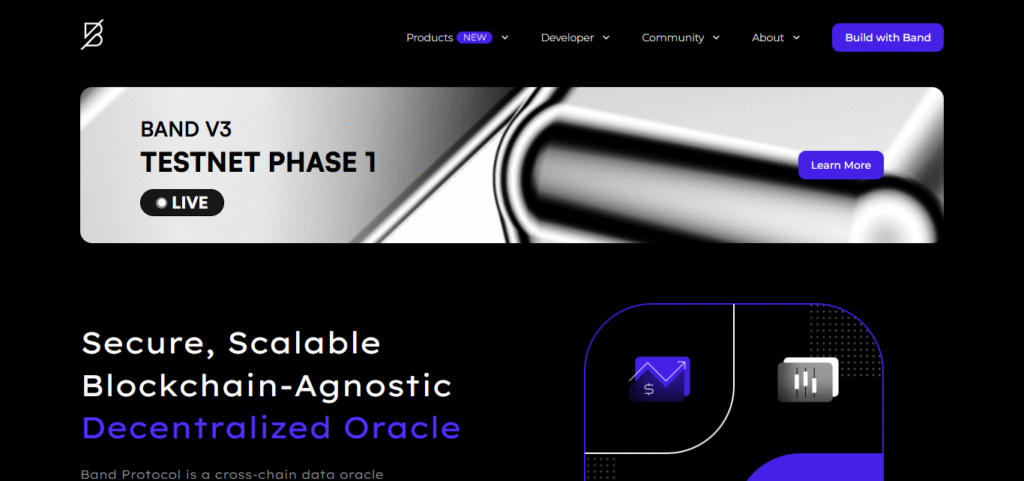
It can be used in conjunction with multiple blockchains, which increases the functions of decentralized applications. Band employs a delegated proof of stake mechanism to guarantee the integrity of the data and the safety of the network.
Focused on performance and scalability, Band Protocol would be ideal for developers looking for an agile and robust oracle solution to drive the next generation of DeFi platforms.
Features Band Protocol
Fast data delivery: As a product of the Cosmos SDK, It serves data to smart contracts in a constant and quick pace.
Low transaction costs: Fee Limits are lower than those of oracle based on Ethereum.
Cross-chain Compatibility: It is compatible with a large number of chains like Ethereum and Binance Smart Chain.
Decentralized Accuracy Data Reporting: Improves estimation of failure points by using a fictitious model to report data, Data accuracy is ensured.
3.API3
API3 is distinguished as an advanced oracle solution centered on first-party data providers. Unlike traditional oracles, API3 allows data providers to communicate with smart contracts through decentralized APIs (dAPIs) enhancing transparency, trust, and security.
Its cross-chain capabilities enables interoperability across multiple blockchains which is suitable for DeFi applications needing high-value and reliable data.
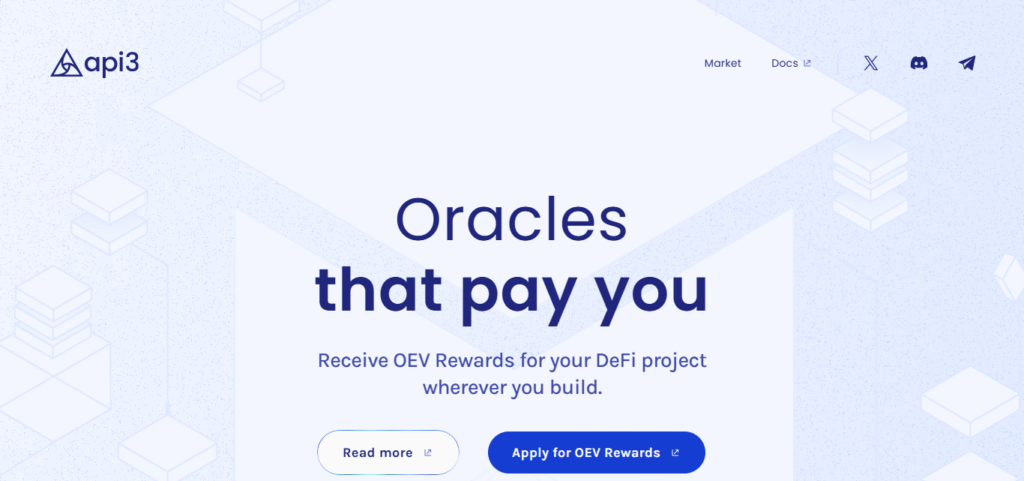
With Airnode technology, API3 allows seamless configuration with low integration requirements and less third-party dependency.
With a focus on data access pathways and strong decentralization, API3 stands out for multi-chain adaptable DeFi developer ecosystems enabling secure, scalable, and efficient use of technology.
Features API3
Oracles from first party: Data giver side are taking full responsibility on exchange with the smart contracts removing any interferences for enhanced accountability.
dAPI Technology: dAPI, an decentralized API crafted by API3, delivers unparalleled level of security and self- audit capabilities on data.
Cross-Chain Linkage: It can be linked easily with many blockchains improving the interoperability of DeFi systems.
Airnode: Simplified warrior append to oracle integrations saves developer precious time.
4.Pyth Network
Pyth Network is an advanced oracle that provides real-time, high precision data of financial markets to decentralized applications.
For data, it fetches it directly from primary exchanges, market makers, and trading firms which is very important for DeFi platforms that need precise pricing for derivatives, lending, and synthetic assets.
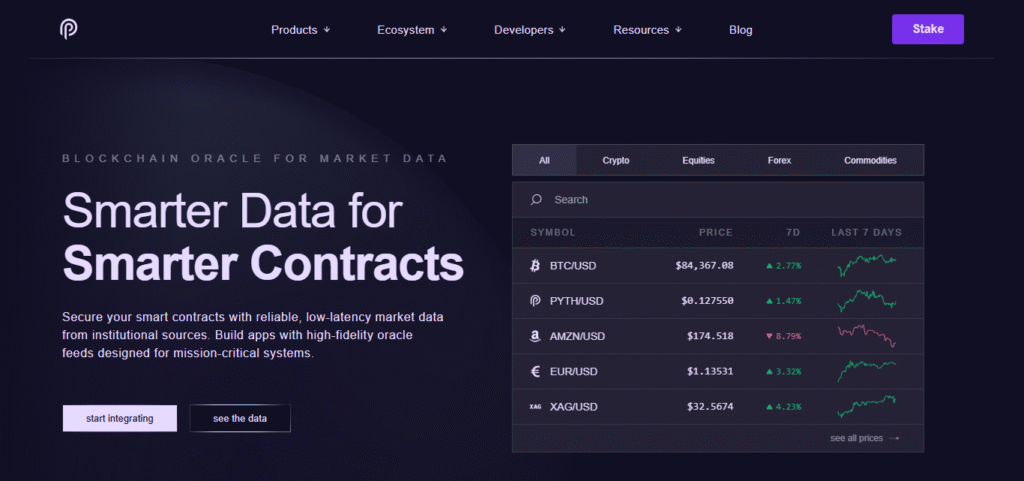
Pyth started with Solana, but now it has cross-chain supports for multiple blockchains as Solana’s ecosystem expanded. Its pull model is more efficient as it only pushes the data when needed, alleviating congestion and cost.
Pyth Network has a national coverage of premium data providers and a stronghold in the institutional DeFi sphere making it an oracle solution provider for critical systems.
Features Pyth Network
High-Frequency Financial Data: Collects and disseminates crucial, high-frequency financial information from renowned market makers and exchanges in real-time.
Cross-Chain Functionality: Originally on Solana, now extends to other blockchain networks for ease of access and flexibility.
Optimized for DeFi: Focused on supplying data applicable to DeFi services such as derivatives and synthetic assets.
Low Latency: Data is sent in real-time with little delay for fast and time-sensitive usage cases.
5.Universal Market Access (UMA)
Universal Market Access (UMA) solves blockhain agnostic problems with its proprietary oracle that enables the trustless verification of data for cross-chain ecosystems while having UMA’s decentral governance primitives.
Unlike traditional oracles, UMA makes use of optimistic oracle techniques wherein data being accurate until proven otherwise which limits chain compute and cost.
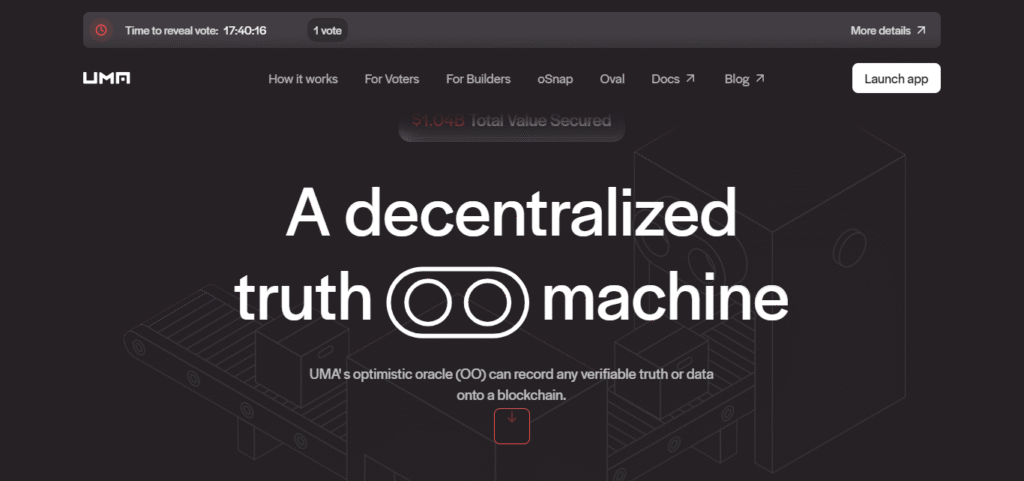
This model works best for strategies requiring soft input boundaries like synthetic assets, prediction markets and other DeFi features.
With UMA’s decentralized governance systems, dispute resolution, and low cost enabling oracle infrastructure, developers have more freedom to build on top and innovate.
Features Universal Market Access (UMA)
Optimistic Oracle Model: Assumes data is credible until proven otherwise, lowering costs by only disputing when absolutely required.
Synthetic Assets: Powers decentralized financial instruments including synthetic assets and prediction markets.
Cross-Chain Interoperability: Easiest to access through numerous blockchains, making it adaptable for various DeFi applications.
Decentralized Governance: Makes it an assurance for transparent decision-making by allowing governance through UMA tokens.
6.Tellor
Tellor is a fully decentralized oracle protocol which permits anyone to serve as a data provider, offering trustworthy information to smart contracts across different blockchains.
It functions on a specific model of mining described as data reporting where participants post information off-chain, and, after checks against a “golden set,” it is placed on-chain through staking, accompanied by a dispute resolution system.
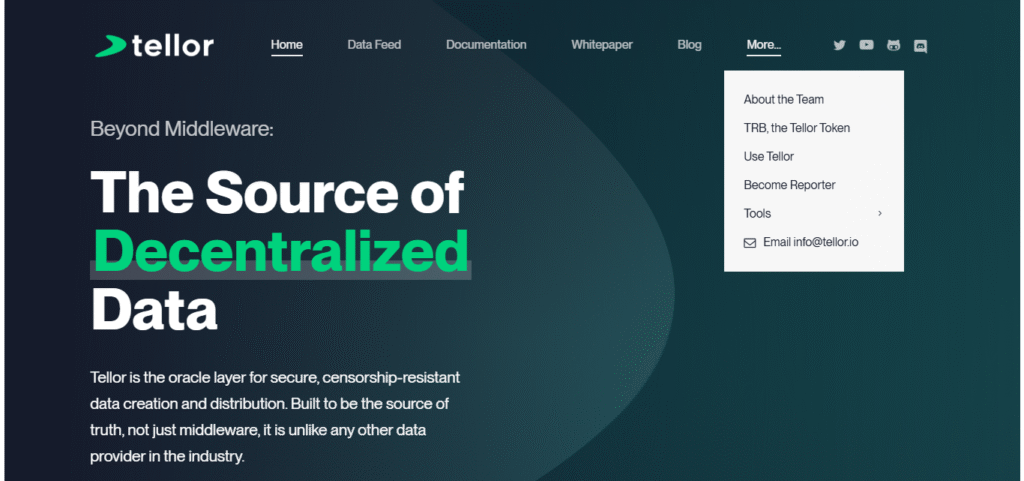
This governance structure increases trust in the validity of the data, while also minimizing the chances of manipulation. Tellor’s architecture is compatible with other blockchain networks, which increases its utility for DeFi developers building on different ecosystems.
Its straightforward design and strong focus on decentralization make Tellor particularly well-suited for applications that need uninterrupted, tamper-proof data. Consequently, it is an optimal oracle provider to support the development of decentralized finance (DeFi) systems.
Features Tellor
Fully Decentralized: Data collection submitting is fully decentralized, allowing honesty through a network of reporters.
Proof-of-Work Consensus: Has a mechanism to provide accurate data called proof-of-work that relies on all the submitted data.
Cross-Chain Support: Tellor provides open access to data from multiple blockchains and integrates with different services.
Data Dispute Mechanism: Highly contested information to ensure quality and accuracy in the provided data feeds for various DeFi projects.
7.DIA
DIA (Decentralized Information Asset) is a community-managed oracle system that provides custom and verified data feeds for DeFi applications.
Unlike traditional oracles, DIA collects data through API calls from various exchanges which then goes through validation and on-chain publication in a transparent open-source manner.
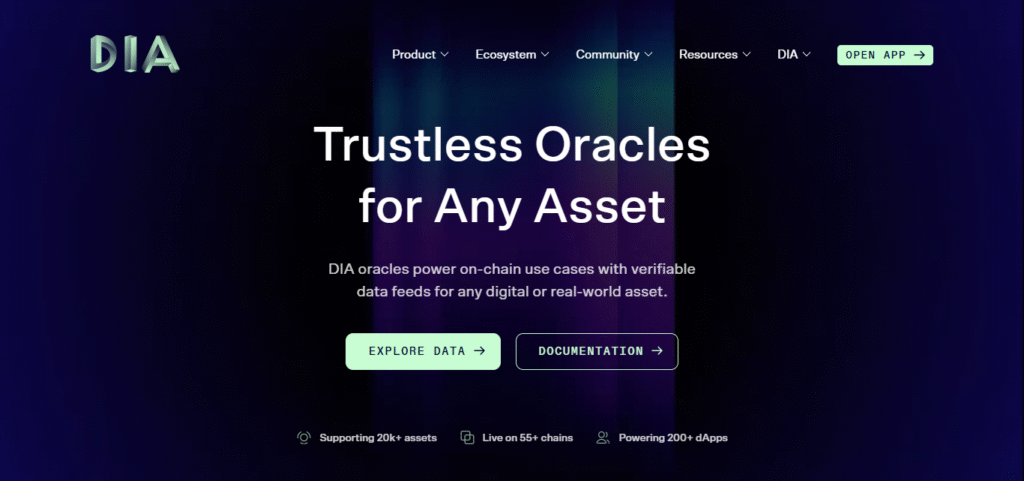
Its flexibility enables developers to customize oracles according to their requirements even for specific asset pairs or different types of data. DIA also aids in cross-chain compatibility with Ethereum, Polkadot, and Avalanche enhancing interoperability.
Owing to its strong data provenance and decentralized governance, DIA is a perfect fit for DeFi projects that require reliable, custom-made, and auditable oracle services.
Features DIA
Transparent Data: Uses multiple data sources, including exchanges, to ensure a single source of trustable and verifiable data.
Customizable Feeds: Developers can create specific data tailored to their requirements, hence offering flexibility.
Cross Chain Functionality: DIA allows working with more than one blockchain, such as Ethereum, Polkadot, and Avalanche.
Decentralized Governance: Stakeholders have the right to voice their opinions for the development and decisions of the oracle in a decentralized network.
8.Razor Network
The Razor Network is an oracle platform which is fully decentralized which provides fast, secure, and scalable data feeds for DeFi applications.
It operates within a proof-of-stake consensus framework which requires validators to stake tokens, thus earning rewards for submitting accurate data upholding the network’s integrity and resistance to manipulation. Having been designed for high throughput and low latency, Razor is well-suited for real-time use cases in DeFi.
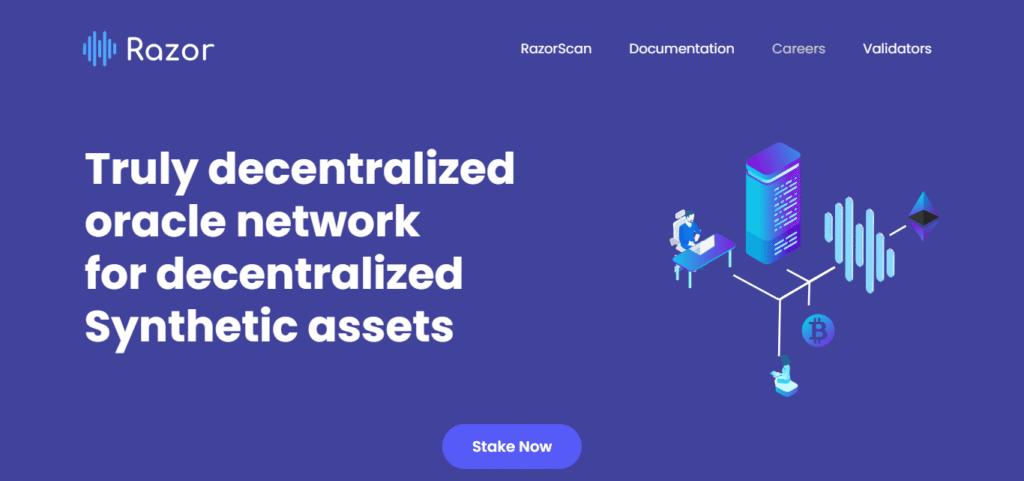
Additionally, it boasts native support for cross-chain functionality enabling effortless integration across myriad blockchain ecosystems.
The emphasis Razor Network has on decentralization, speed, and flexibility makes it a formidable oracle option for developers constructing sophisticated and efficient DeFi solutions.
Features Razor Network
Decentralized Data Reporting: Maintains trust in the data by having a collection of independent verifiers.
Cross Chain Compatibility: Razor Network can robustly interact with Ethereum, Polkadot, and other blockchains.
Scalable and Fast: Designed to deliver a high volume of data and low latency data for real-time applications.
Secure and Reliable: This is done through a Proof-of-Stake (PoS) consensus mechanism where validators are incentivised for accurate data reporting.
9.DOS Network
DOS Network is a multi-blockchain compatible decentralised oracle network that connects off-chain data and computing with smart contracts.
It provides rapid, secure, and tamper-proof information feeds for DeFi services and is particularly focused on improving scalability and efficiency.
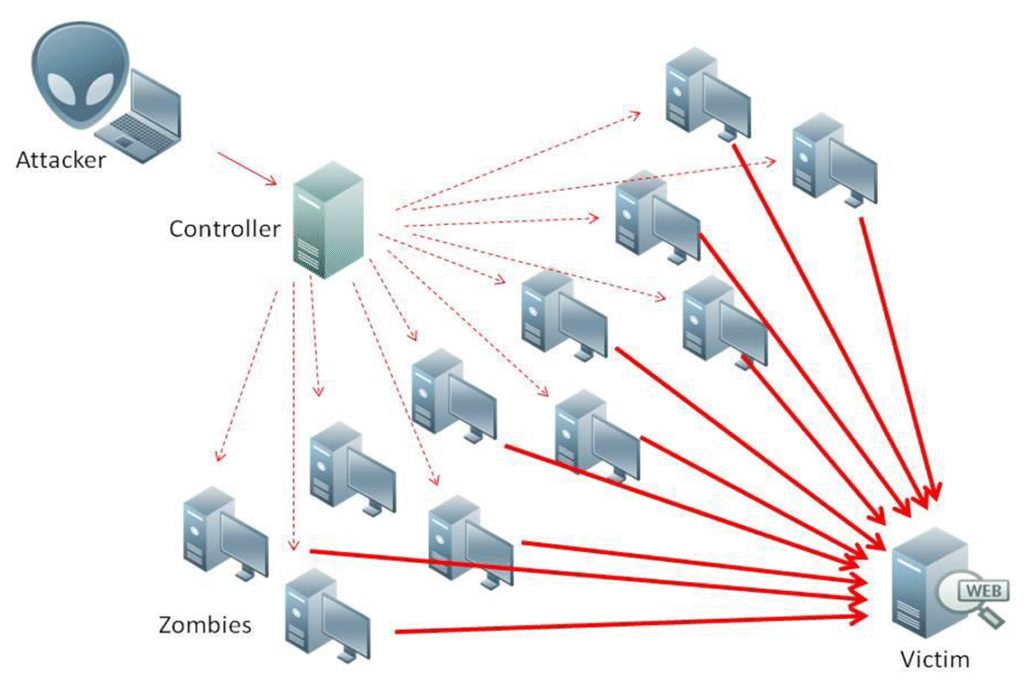
It utilizes a proprietary Layer-2 structure to offload operations and reduce costs for effortless application into the decentralized finance frameworks.
With cross-chain integration, it works on several blockchains, empowering developers to create dynamic and interlinked DeFi services. Its open framework and transparency makes it a trustworthy provider for DeFi data solutions.
Features DOS Network
Layer-2 Infrastructure: Utilizes Layer-2 scaling solutions to improve the scalability and reduce the cost of data processing.
Cross Chain Data Feeds: Supports multiple blockchains, enhancing interoperability in DeFi.
Off-Chain Computing: Applies powerful compiling outside of the blockchain to smart contracts, increasing the potential for these systems beyond just simple data feeds.
Decentralized and Secure: Guarantees the security and integrity of data through decentralized consensus and data validation.
10.Avalanche
Avalanche is considered a powerful blockchain as it allows transactions to be made quickly, at a low-cost, while ensuring cross-chain interoperability. This makes it a great candidate for running DeFi applications.
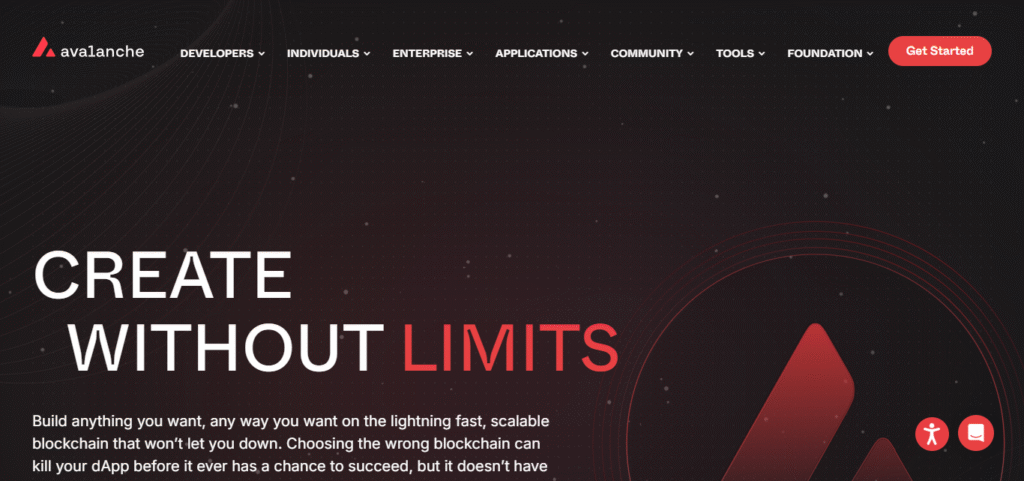
Avalanche does not use any oracle solutions itself, but integrates smoothly with Chainlink and Band Protocol to offer multi-chain accurate up-to-the-minute data. Blockchain functions better with Avalanche-X as consensus when scaling and finality speed are vital to DeFi platforms.
Avalanche has cross-chain capabilities which means that DeFi projects hosted will have access to an extensive collection of reliable oracles. This improves the flexibility and functionality of the decentralized finance applications using dependable data providers from multiple networks.
Features Avalanche
DeFi Transaction Speed: Increased throughput related to transaction confirmation latency is suitable for DeFi applications because Avalanche uses sub-second consensus mechanisms.
Multichain Cross-Integration: Works with multiple oracle services that supply trustworthy data for various blockchains.
Definitional Custom Blockchains (Subnets): Provided with greater control, DeFi developers are able to create and manage tailored blockchains (subnets) to further refine specific use cases.
Decentralized Scalability: TPas developed for Avalanche’s network exceed thousands per second. Transaction processing is decentralized, thus maintaining the shard-like structure.
Conclusion
To wrap everything up, the selection of a cross-chain oracle for a DeFi application is mostly dependent on the needs of the project in terms of speed, security, and compatibility with other blockchains.
APIs, for instance, Band Protocol, and even Chainlink offer great services, while Tellor and UMA focus on providing specific benefits for decentralized data services. Taking these considerations enables one to pick the best suited for their DeFi project.



